39 zero coupon bonds tax
Zero-Coupon Bond - Definition, How It Works, Formula John is looking to purchase a zero-coupon bond with a face value of $1,000 and 5 years to maturity. The interest rate on the bond is 5% compounded annually. What price will John pay for the bond today? Price of bond = $1,000 / (1+0.05) 5 = $783.53 The price that John will pay for the bond today is $783.53. Example 2: Semi-annual Compounding Advantages and Risks of Zero Coupon Treasury Bonds - Investopedia If issued by a government entity, the interest generated by a zero-coupon bond is often exempt from federal income tax, and usually from state and local income taxes too. Various local...
Zero Coupon Bonds- Taxability Under Income Tax Act, 1961 - TaxWink According to this proviso, tax on long term capital gain on zero coupon bonds shall be lower of the following: - (a) Tax on capital gains computed normally @ 20% on difference of maturity price and purchase price (indexed) or

Zero coupon bonds tax
Zero Coupon Bond | Investor.gov Because zero coupon bonds pay no interest until maturity, their prices fluctuate more than other types of bonds in the secondary market. In addition, although no payments are made on zero coupon bonds until they mature, investors may still have to pay federal, state, and local income tax on the imputed or "phantom" interest that accrues each year. The One-Minute Guide to Zero Coupon Bonds | FINRA.org Instead of getting interest payments, with a zero you buy the bond at a discount from the face value of the bond, and are paid the face amount when the bond matures. For example, you might pay $3,500 to purchase a 20-year zero-coupon bond with a face value of $10,000. After 20 years, the issuer of the bond pays you $10,000. Zero-Coupon Bonds: Characteristics and Examples - Wall Street Prep Even though the bondholder technically does not receive interest from the zero-coupon bond, so-called "phantom income" is subject to taxes under the IRS. However, certain issuances can avoid being taxed, such as zero-coupon municipal bonds and Treasury STRIPS. Zero-Coupon Bond Exercise - Excel Template
Zero coupon bonds tax. Are Bonds Taxable? 2022 Rates, Types of Bonds, Tax-Minimizing Tips With a zero-coupon bond, you buy the bond at a discount from its face value, don't receive interest payments during the bond's term, and are paid the bond's face amount when it matures. For... Zero Coupon Municipals Are About To Get Significantly Less Attractive Zero coupon bonds are those that don't pay a regular interest coupon. Instead they're issued at a discounted price which when held to maturity and repayment would equal a useful interest rate.... How to Buy Zero Coupon Bonds | Finance - Zacks The bonds are issued at a minimum face value of $1,000, and the earliest a Treasury zero bond matures is in 10 years. The bond interest income is taxed at the federal level and possibly at the... How Do Zero Coupon Bonds Work? - SmartAsset A zero coupon bond doesn't pay interest, but it could pay off for your portfolio. Choosing between the many different types of bonds may require a plan for your broader investments. A zero coupon bond often requires less money up front than other bonds. Yet zero coupon bonds still carry some of risk and can still be influenced by interest rates.
Investor's Guide to Zero-Coupon Municipal Bonds Zero-coupon bonds are sold at a substantial discount from the face value. For example, a bond with a face value of $20,000, maturing in 20 years with a 5.5% coupon, may be purchased at issuance for roughly $6,757. At the end of the 20-year investment, the investor will receive the full $20,000 face value. Zero Coupon Bonds - David Lerner Associates When a zero coupon bond matures, the investor receives the full face amount of the bond. Long-term bonds and zero coupon bonds are more exposed to interest rate risk than short-term bonds and coupon bonds. Zero coupon municipal bonds are attractive to investors seeking tax advantages and long-term capital accumulation for retirement, education ... What Is a Zero-Coupon Bond? - Investopedia The imputed interest on the bond is subject to income tax, according to the Internal Revenue Service (IRS). Therefore, although no coupon payments are made on zero-coupon bonds until maturity,... Zero Coupon Municipal Bonds: Tax Treatment - TheStreet , the tax rules for zero-coupon bonds bought as new issues and held to maturity are fairly simple. Whether the bond is taxable or tax exempt, you have to accrue interest on the bond. That means you...
Zero-Coupon Bond Value | Formula, Example, Analysis, Calculator The value of a zero-coupon bond is determined by its face value, maturity date, and the prevailing interest rate. The formula to calculate the value of a zero-coupon bond is. Price = M / (1+r)n. where: M = maturity value or face value of the bond. r = rate of interest required. n = number of years to maturity. 3. Taxes and zero coupon bonds - FMSbonds.com Tax-exempt interest earned on zero coupon bonds should be reported on your 1040, along with all other tax-exempt interest received. The interest reported is based on the original issue price and yield or, as you stated, "the bond's original accretion.". Your adjusted basis in the bonds at any time after purchase would be your actual ... Do you pay taxes on zero coupon bonds? - Quora When zero coupon bonds first came out, you only paid tax when you sell them or at the end of their terms when you cash them in. This was one of the attractive aspects of zero coupon bonds for some people. For example, suppose you were currently aged 58 and earning enough money to be in a fairly high tax bracket. Zero-Coupon Bonds - Tax Professionals Member Article By Carmen Garcia A zero-coupon bond is a type of fixed income instrument that pays no interest on the principal until maturity. Municipalities and businesses often issue Zero-coupon bonds to make saving for retirement, education, or other purposes more affordable.
The ABCs of Zero Coupon Bonds | Downing Tax & Financial Service Zero coupon bonds are indeed debt instruments, but are issued at a discount to their face value, make no interest payments, and pay its face value at time of maturity. How Does it Work? Let's say, a hypothetical zero coupon bond is issued today at a discount price of $743 with a face value of $1,000, payable in 15 years.
Zero coupon municipal bonds maturation - Intuit The tax rules for zero-coupon bonds bought as new issues and held to maturity are fairly simple. Whether the bond is taxable or tax exempt, you (or your broker) have to accrue interest on the bond. That means you have to calculate the portion of the difference between the purchase price and face value that accrued to you. $500 x 0.0705 = $35.25 ...
The ABCs of Zero Coupon Bonds | Tax & Wealth Management, LLP Zero coupon bonds are subject to an unusual taxation in which the receipt of interest is imputed each year, requiring holders to pay income taxes on what is called "phantom income." Target Dates For individuals, zero coupon bonds may serve several investment purposes.
Section 2(48) Income Tax: Zero Coupon Bonds - CA Club a) Meaning of 'Zero Coupon Bond': Section 2 (48) Income Tax As per Section 2 (48) of Income Tax Act, 1961, unless the context otherwise requires, the term "zero coupon bond" means a bond- (a) issued by any infrastructure capital company or infrastructure capital fund or public sector company or scheduled bank on or after the 1st day of June, 2005;
Impact of Taxation on Zero-Coupon Muni Returns - MunicipalBonds.com Taxation on zero-coupon munis is only realized upon their sale or maturity. If the bond is sold before its maturity, it is either sold at a discount or a premium in the secondary market. Any price paid above the adjusted issue price (discussed below) will be premium and any price below the adjusted issue price will be discount.
Zero Coupon Bonds: Know tax rules when such a bond is held till ... When a zero coupon bond is sold in Off market which was originally purchased from secondary market, the same will be taxed akin to the scenario when a zero coupon bond is bought from primary market...
What Are Zero Coupon Bonds? Valuable Insights | TradeSmart Pricing of zero coupon bond. You might be wondering how the price of a zero coupon bond i s calculated. Here are the details based on the zero coupon bonds calculation of price is done: Zero Coupon Bond Price = M / (1+r)n, Where M is the bond's maturity value or face value, r is the needed interest rate, and n is the number of years before ...
What is the tax implication on zero coupon bonds? Updated. Any long term capital gain on sale of zero coupon bonds shall be charged to tax at minimum of the following: 20% of LTCG After indexation of cost of such bonds or 10% of LTCG before indexation of cost of such bonds. Zero coupon bonds, Investing in Zero Coupon Bonds, Tax Considerations for Zero Coupon Bonds Explained the tax implication ...
Tax Considerations for Zero Coupon Bonds - Financial Web Tax Considerations Zero coupon bonds have unique tax implications. Technically, you are earning interest every year, even though you do not see it until the end of the bond term. Therefore, you have to pay the taxes on the interest every single year even though you do not get the interest until the end of the arrangement.
14.3 Accounting for Zero-Coupon Bonds - Financial Accounting Figure 14.9 December 31, Year One—Interest on Zero-Coupon Bond at 6 Percent Rate 3. The compounding of this interest raises the principal by $1,068 from $17,800 to $18,868. The balances to be reported in the financial statements at the end of Year One are as follows: Year One—Interest Expense (Income Statement) $1,068.
Zero-Coupon Bonds: Characteristics and Examples - Wall Street Prep Even though the bondholder technically does not receive interest from the zero-coupon bond, so-called "phantom income" is subject to taxes under the IRS. However, certain issuances can avoid being taxed, such as zero-coupon municipal bonds and Treasury STRIPS. Zero-Coupon Bond Exercise - Excel Template
The One-Minute Guide to Zero Coupon Bonds | FINRA.org Instead of getting interest payments, with a zero you buy the bond at a discount from the face value of the bond, and are paid the face amount when the bond matures. For example, you might pay $3,500 to purchase a 20-year zero-coupon bond with a face value of $10,000. After 20 years, the issuer of the bond pays you $10,000.
Zero Coupon Bond | Investor.gov Because zero coupon bonds pay no interest until maturity, their prices fluctuate more than other types of bonds in the secondary market. In addition, although no payments are made on zero coupon bonds until they mature, investors may still have to pay federal, state, and local income tax on the imputed or "phantom" interest that accrues each year.
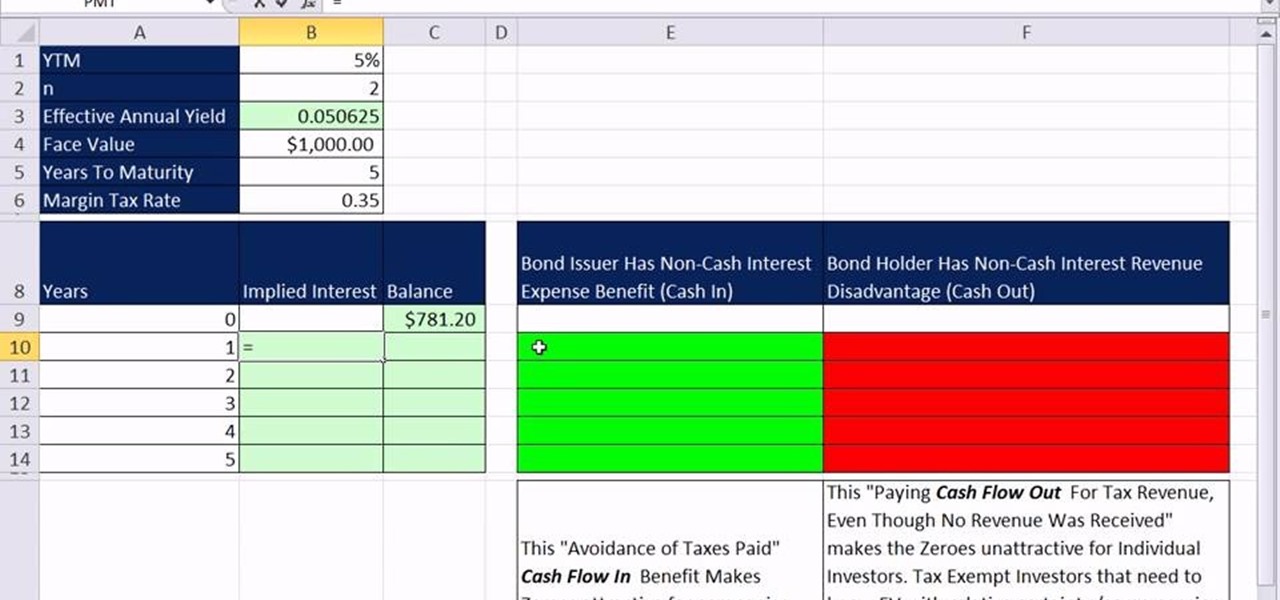




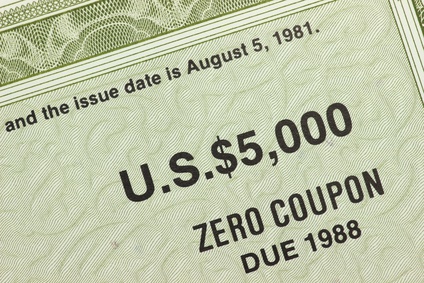




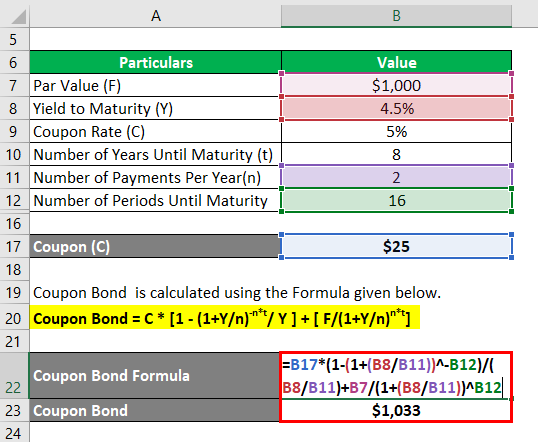

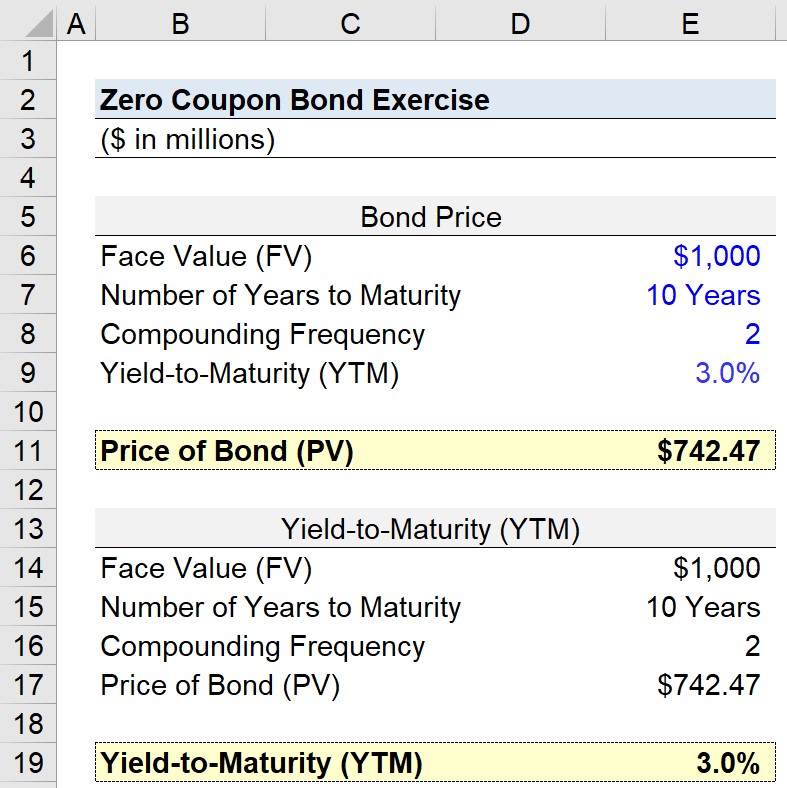










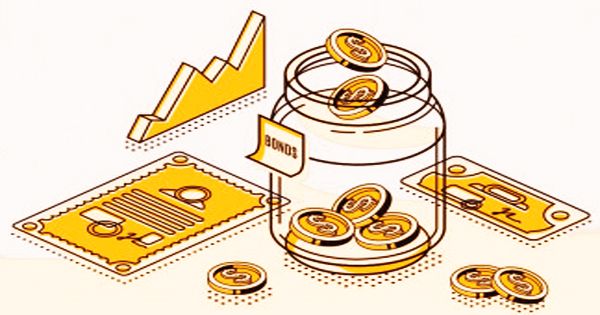


/zero-couponbond_final-a6ec3618516a49c9a3654a1c79c9b681.png)

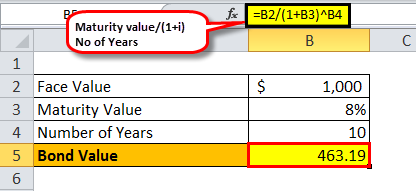
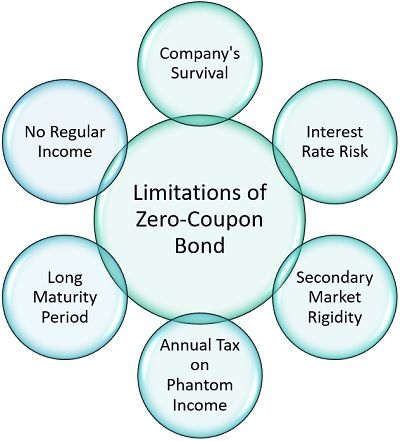

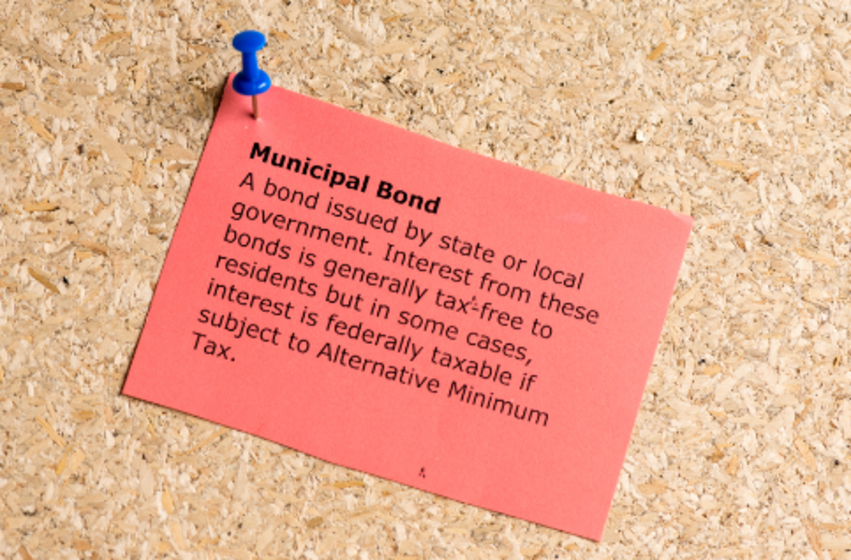

Post a Comment for "39 zero coupon bonds tax"